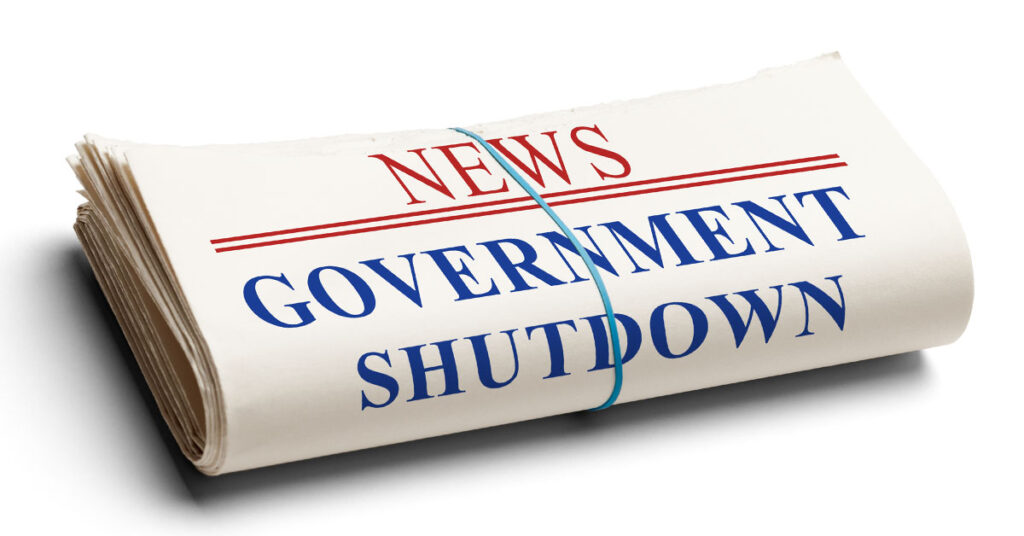September 30th was the final day before government funding expired. Thankfully, a last-minute agreement was passed by the House and Senate to keep it funded through to November 17th, narrowly avoiding a government shutdown. But, what happens when November 17th comes around? And how will it affect you, as a retiree or pre-retiree? What can you do in order to prepare? Today, we’ll discuss what a government shutdown is, shutdowns that have occurred in the past, and answer some frequently asked questions about it. to hopefully help you prepare.
First, it’s important to understand what a government shutdown is. It refers to when the government fails to pass a budget or spending bill to fund government operations, resulting in many government services and functions being temporarily disrupted. Additionally, a shutdown affects government employees and contractors, and can harm the economy. A shutdown is usually the result of a budgetary impasse or a failure to reach an agreement on government funding between the legislative and executive branches of government.
Prior Government Shutdowns
Shutdowns have occurred periodically when there has been a failure to pass federal budgets or funding bills, such as what we narrowly avoided in September.
Ever since Congress introduced the modern budget process in 1976, there have been 20 funding gaps, during which funds were not appropriated for at least a day. However, prior to 1980, the government did not encounter a full shutdown. Rather, they continued normal operations through these funding gaps. Since 1981, a total of ten funding gaps of three days or fewer have occurred. During these gaps, government operations were affected only minimally.
There have now been a total of 4 “true” shutdowns so far, in which operations were negatively affected for more than only one business day. The first two, taking place in 1995 and 1996, each lasted 26 days. The third was in 2013, lasting 16 days. The fourth shutdown, during the winter of 2018 and 2019, was the longest so far. It lasted 35 days.
Frequently Asked Questions
How might a government shutdown personally affect you? The answer to this varies depending on your specific situation. Here are answers to some frequently asked questions, that may help you gain a better understanding of what you can expect from a shutdown.
Some things that we can assure you will most stay unaffected include:
Most Likely Will Not Be Affected
Would a government shutdown affect when I receive my Social Security?
No, it would not. A government shutdown would not impact Social Security’s funding, however, some Social Security Administration employees would be temporarily suspended, meaning their customer service could potentially be impacted.
Would Medicare and Medicaid benefits be affected?
Current Medicare, Medicaid, and disability insurance beneficiaries would continue to receive their benefits even in the event of a shutdown.
Would you still receive your mail?
Yes, you would. The U.S. postal service would be completely unaffected during a government shutdown, so you would still get your mail.
Would military and federal retiree benefits be suspended?
Military and federal retirees would continue to receive retirement benefits. Processing new applications or other requested changes would, however, be delayed.
How would a shutdown impact state and local services?
A federal government shutdown would not, at least immediately, affect any state or local services. However, some state or local governments may change their operations with federal funding cut off. You’d have to check with your own state and local agencies for specifics.
What Will Be Negatively Affected?
How would this affect environmental protection and cleanup?
During a government shutdown, the EPA would stop inspecting most hazardous waste sites, as well as drinking water and chemical facilities. Efforts to address dangerous contaminants linked to adverse health effects would also be delayed, which is quite worrisome.
Would air travel be affected?
Air traffic controllers, TSA, and Customs and Border Protection agents would remain on the job without pay. However, if some do not report to work (which has historically happened during shutdowns) it would result in significant delays across the country.
What would a shutdown mean for disaster relief efforts?
FEMA staff would still respond to emergencies. However, they’d be forced to delay long-term projects due to a lack of funding for the Disaster Relief Fund.
What would this mean for medical research?
Unfortunately, the National Institutes of Health would be forced to delay new clinical trials. Furthermore, new patients waiting for a chance at treatment through a clinical trial would be turned away.
What would be the impact on food assistance?
The Special Supplemental Nutrition Program for Women, Infants, and Children (WIC) would quickly run out of funding during a shutdown, and be unable to provide food for children and parents in need.
What would be the effect on housing?
The Federal Housing Administration (FHA) would have to stop insuring some new mortgages. Additionally, the Department of Housing and Urban Development (HUD) would stop processing some new loans. Funding for federal housing assistance programs, such as Housing Choice Vouchers, may be jeopardized in the event of a prolonged shutdown.
We Can Help
A fixed indexed annuity (FIA) offers you a source of income that can last you your entire life, and wouldn’t be affected in the event of a government shutdown. And right now, one of our annuity products is offering a 40% bonus: That means that for every $100K added to your annuity, an additional $40K would be added to your income and death benefits. And that’s the best offer we’ve ever seen on one of these products. Reach out to Retallick Financial Group to learn more.
Source: Debbie Dingell


